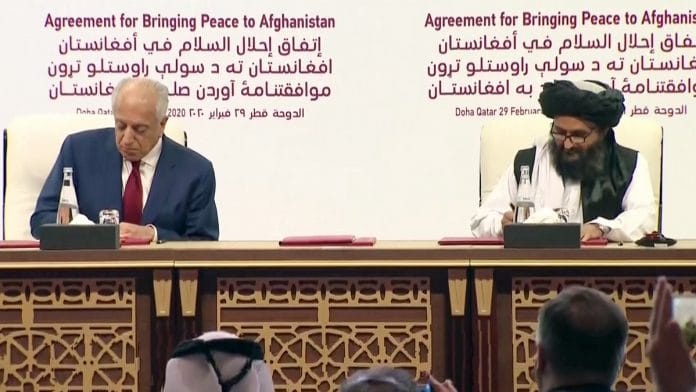The Indian embassy in Kabul has issued a security advisory for Indian nationals in Afghanistan, terming the security situation “dangerous”. Various terrorist outfits have scaled up violence and carried out attacks on outsiders, including non-locals of Afghan origin. Although the Indian nationals have been strongly advised to avoid non-essential movement and peak hour commuting, it is doubtful if the situation will return to normality any sooner.
There is a high possibility that someday New Delhi may have to evacuate Indians and other willing Asians, and keep only a skeleton staff in the embassy. Soon, every other sensible country will follow suit — airlift its nationals and close down their embassies. Those who stay back will be at the mercy of gun-wielding Taliban terrorists who would by then have taken over the country. This is what the proposed US withdrawal from Afghanistan by the second week of September will do.
The Afghan policy of the successive US governments seems to be one of the most confused, complicated and aimless one, resulting in making the region volatile and unstable. This lack of direction and flawed objectives brought the absence of ground support, forcing the superpower to depend on Pakistan. Thus, the US war on terrorism was fought from the very soil that became the epicentre of terrorism.
Also read: India playing the Taliban move won’t checkmate Pakistan
Not the first retreat
In the background of America’s crushing defeat in the Vietnam War and the US-USSR détente of the seventies, the Soviet Union embarked on a massive rejig of its West Asia policy to contain the radicalisation of Iran, wean Pakistan away from the US orbit and install a pro-Communist regime in Kabul. The “Brezhnev Doctrine” advocated Moscow’s “right and duty” to protect socialist regimes if threatened anywhere in the world. The Soviet Union’s invasion of Afghanistan was primarily motivated by its hegemonic objectives and to secure geopolitical interests in the region. The disintegration of the Soviet Union closed the chapter on Cold War.
The Afghan War entered a disastrous phase with the subsequent entry of the US-led strategists into Afghanistan and the creation of the Taliban as a fighting force to oust the Soviet Union’s Red Army with the help of Pakistan’s ISI through “Operation Cyclone” (a code name supposedly coined and used by the CIA to provide assistance to Mujahedeen fighters).
The ensuing politico-security vacuum gave rise to the Taliban, which subsequently took control of entire Afghanistan and enlisted the support of al-Qaeda, the Haqqani network and the ISI, ringing alarm bells in Washington.
The United Nations Security Council adopted Resolution 1267 in 1999 to create the Al Qaeda & Taliban Sanctions Committee with a view to limit their capabilities to perpetuate terror. But the killing of Ahmad Shah Massoud of Northern Alliance in 2001 and the 9/11 attacks on the US soil forced Washington to initiate ‘Operation Enduring Freedom’. The Taliban was unseated and the UN Security Council’s Resolution 1378 called for a “central role” for the UN in establishing a transitional government.
Twenty years later, if the US wants to quit Afghanistan, leaving it in as much a messy condition as it was when its forces entered the country post 9/11, what is the rationale in handing over power back to Taliban? Why can’t the UN step in again and play a “central role” like it was done through the Bonn Agreement and the establishment of International Security Assistance Force (ISAF) to keep the democratically elected government intact, promote democracy and assure economic progress and social cohesion?
Also read: To be or not to be in Afghanistan is not an easy question for India
A player-in-waiting
Portends of a much greater disaster and a longer spell of instability coupled with increased violence seem to be Afghanistan’s fate in the near future. The place long vacated by the Soviets will now be filled by China — a much stronger force endowed with greater financial strength and hegemonic ambitions. The US has only one exit door for its troops to quit Kabul but China has multiple entry points into Afghanistan. The disastrous consequences of a China-Pakistan-Taliban nexus in Kabul will be a huge security and strategic challenge to India.
There are limited options before New Delhi in the given situation but India can quickly get into action mode to minimise the collateral damage to its security and power equations in the region. There are reports of New Delhi establishing contacts with a section of the Taliban. This will help India in securing the safety of its assets in Afghanistan and guarantee a foothold for operations in the post-US withdrawal scenario. While India will not put its boots on the ground, it will have to devise a strategy to continue training and supporting the Afghan National Security Forces (ANSF).
India’s involvement in the reconstruction of Afghanistan and the infrastructure projects in Iran are part of a larger strategy to secure New Delhi’s interests in the region. Again, Quad is yet another platform where India is active and is expected to play a much bigger role. At a time when the Quad is seriously considering multiple manoeuvres to maintain strategic balance in the region, form a coalition of democracies and promote the idea of free and open Indo-Pacific for a sustainable and equitable economic growth, the US’ withdrawal of forces from Afghanistan will deal a blow to the Quad. New Delhi, therefore, can consider channelising world opinion on the dangers to democracy and resurgence of global terrorism so as to prod the United Nations into stepping in.
When Winston Churchill learned about the Indian Partition plan, he had reportedly told Lord Wavell in 1945 to ‘keep a bit of India’. It is time for New Delhi to tell the White House to ‘keep a bit of Afghanistan’.
Seshadri Chari is the former editor of ‘Organiser’. Views are personal.
(Edited by Anurag Chaubey)






